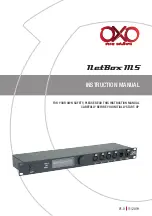
UpMix
User
Manual
5
Technical
Specifications
Latency of the DTS Algorithm:
<22ms at 48k sampling rate
Power Consumption:
25W
Maximum
Dimensions:
Rack Mount; 1 RU (1.75” x 19” x 10.75”)
Sample Rate:
32kHz-96kHz,
24-bit
Dynamic Range:
140dB, DR any input to any output
GPIO:
DB-9 Female, 0-5V TTL opto-isolated
Regulatory:
North America:
Designed to comply with FCC Class
A part 15 requirements.
Europe:
Designed to comply with LV Directive
73/23/EEC and EMC Directive 89/336/EEC; CE Mark
(EN 55022 Class A, EN55024); Designed for RoHS
and WEEE compliance.
FCC
Part
15
Regulatory
Statement
This equipment has been tested and found to comply with the limits for Class A digital device pursuant
to Part 15 of the FCC Rules. These limits are designed to provide reasonable protection against
harmful interference when the equipment is operated in a commercial environment. This equipment
generates, uses, and can radiate radio frequency energy and, if not installed and used in accordance
with the instruction's manual, may cause interference to radio communications. Operation of this
equipment in a residential area is likely to cause interference in which case the user will be required to
correct the interference at their own expense. The user is cautioned that changes and modifications
made to the equipment without approval of the manufacturer could void the user's authority to operate
this equipment. The user should use only shielded and/or grounded cables to combat sources of
interference.
Environmental
Preservation
Efforts
This equipment has been designed and built by DaySequerra corporation to give
many years of trouble free service and is backed by our three year warranty and
commitment of providing the best customer support. When the time comes to retire
your product from service, it should be disposed of in accordance with local codes or
ordinances. Do not discard with household or commercial waste.
DaySequerra products are manufactured with the environment in mind. The Directive
on the restriction of the use of certain hazardous substances in electrical and electronic
equipment (2002/95/EC) restricts the use of six specific hazardous materials in the
manufacture of various types of electronic and electrical equipment. Following this
directive prevents these toxic substances from entering our environment after disposal.






































